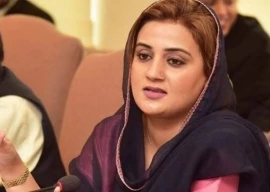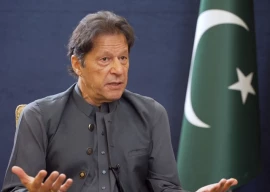
Prime Minister Imran Khan on Sunday observed that sex crimes and corruption had sharply increased in societies, saying these issues were not confined to one country.
#APPNews : Exclusive dialogue between PM @ImranKhanPTI & globally-acknowledged Muslim Scholars under the theme: 'Islam, Society and Ethical Revival' Part-2 @PakPMO https://t.co/y0psQoeHZs
— APP 🇵🇰 (@appcsocialmedia) January 2, 2022
He opined that a society should take a stand against corruption making it unacceptable.
The premier made these remarks in the second part of dialogue with eminent Muslim scholars on “Riyasat-e-Madina, Islam, society and ethical revival” held by National Rehmatul-lil-Alameen Authority.
The scholars stressed the need to grapple with issues emanating from globalisation and a plethora of untamed information on the internet through proper guidance of the Muslim youth.
They highlighted that through the creation of adequate awareness about the Seerat and Sunnat, the Muslim youth should be educated to glide through the current age challenges and dotted down certain collective efforts by the Muslim countries to brace for the negative impacts of modernity.
Read more: Faith is something that cannot be forced: PM Imran Khan
The prominent scholars included Sheikh Abdullah bin Bayyah, Dr Timothy Winter/Abdal Hakim Murad, Dr Seyyed Hossein Nasr, Dr Recep Senturk, Dr Osman Bakar, Shaykh Hamza Yusuf and Dr Chandra Muzaffar. They responded to various questions raised by the PM about the unbridled availability of social media material, corruption, rising sex offences against women and children and other contemporary challenges posed to the Muslim youth and society.
Taking part in the discussion, Dr Seyyed Hossein Nasr, University Professor of Islamic Studies at the George Washington, US, alluded to the impacts of the modernistic trends upon the Muslim youth which could be felt much more than ever. He said the youth should be taught that spirituality was a real phenomenon while the mundane attractions were temporary.
“Today, the world is more precarious and dangerous for the youth,” he said, adding that the Muslim youth should be guided through the teachings which were authentic and pertaining to the current challenges. Dr Nasr denounced that in the West, certain non-serious elements talked about Islam in a negative tone, which was tantamount to attacking the religion.
He maintained that Islam offered solutions to the most urgent issues of the day, adding that the Muslim countries were blessed with tremendous resources which they could utilise to revive and preserve their culture on the basis of faith in the religion.
'Society must take stand against corruption'
Shaykh Hamza Yusuf, an American scholar, responding to the prime minister’s query about the corruption and increasing trend of sexual offences against women and children, agreed that these were the profound problems arising from greed in society. The prime minister said that sex crimes and corruption had sharply increased in societies and added that these issues were not confined to one country. He suggested that a society should take stand against corruption to make it unacceptable.
Also read: Discrimination between powerful and weak destroys societies: PM
Dr Yusuf further likened the issue of corruption to a rotten apple that could decay a society. He said that Islam had tasked men to take care of the womenfolk and children in a society, stressing that youth should be educated to honour women. Dr Timothy Winter/Abdal Hakim Murad said that information on mobile phones for the young generations was a real challenge for most of the societies across the globe.
"The youth had become addicted to certain undesirable material which led to permanent damage," he added. He said that the use of internet had now become a global phenomenon that should be resolved through global efforts. He regretted that thousands of cases of harassment against women had been reported.
Dr Recep Senturk, a Turkish academic, and president of USUL Academy, Turkey, shared that in the face of global problems, the Muslim youth should be advised to adopt ethics derived from the Sunnat.
"They should be encouraged to develop their intellectual independence by following the Sunnat and rid themselves of the global hegemony," he added.
Dr Chandra Muzaffar, a Malaysian sociologist and thinker, suggested holding conferences of the Muslim youth so that they could participate and speak out their minds and articulate their position over the contemporary challenges and solutions. He said during the climate change conference in Switzerland, the youth participants had vented their anger against climate issues and shared their thoughts.
“The people across the world should realise that all burning issues in today’s world are challenges to which Islam had beautifully provided solution centuries ago,” he said. Dr Osman Bakar, an emeritus professor of philosophy at the University of Malaysia, opined that it was encouraging that students in universities and colleges were keen to learn about spiritual traditions.
He emphasised upon interfaith and intercultural dialogue which would bring stability in the future. "The religion of Islam had stressed upon interfaith harmony." Sheikh Abdullah bin Bayyah, Chairman of Fatwa Council UAE, said that they were living in the age of globalisation and invasion of social media where internet and other gadgets had been casting huge impacts on the youth.
He suggested the idea of seeking ‘Sakinah’ by the youth which meant peacefulness of mind. "It was the quality of soul that helped in the removal of agitation from a person," he maintained. Sheikh Abdullah underlined the need for the establishment of a university for the Muslim youth that could focus on teaching morals and ethics.
He urged the youth of Pakistan to learn more about people like Allama Iqbal. The prime minister hinted that he would be holding a similar dialogue with the renowned scholars in the future so as to get their enlightening views about contemporary issues. He said that his idea of the establishment of the National Rehmatul-lil-Alameen Authority in Pakistan was to unite human beings under the teachings of Seerat and raise standards of morality and ethics in society.

1729662874-0/One-Direction-(1)1729662874-0-405x300.webp)


1722421515-0/BeFunky-collage-(19)1722421515-0-165x106.webp)

1726722687-0/Express-Tribune-Web-(9)1726722687-0-270x192.webp)

1732103737-0/Copy-of-Untitled-(55)1732103737-0-270x192.webp)












COMMENTS (17)
Comments are moderated and generally will be posted if they are on-topic and not abusive.
For more information, please see our Comments FAQ